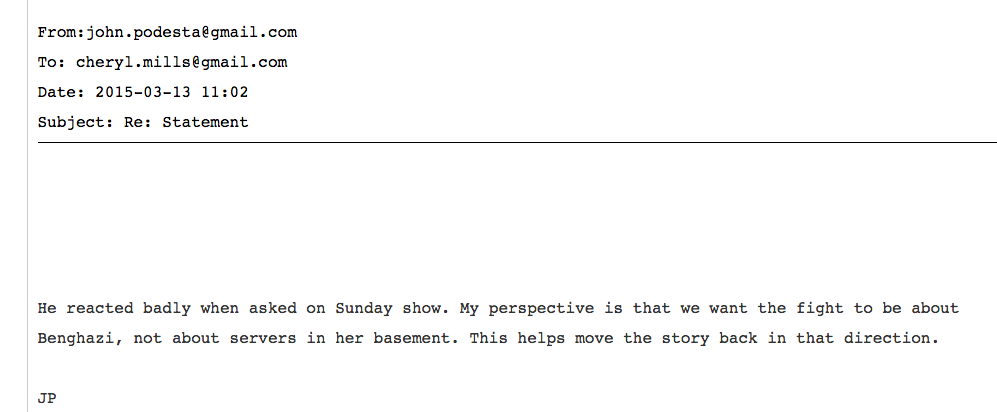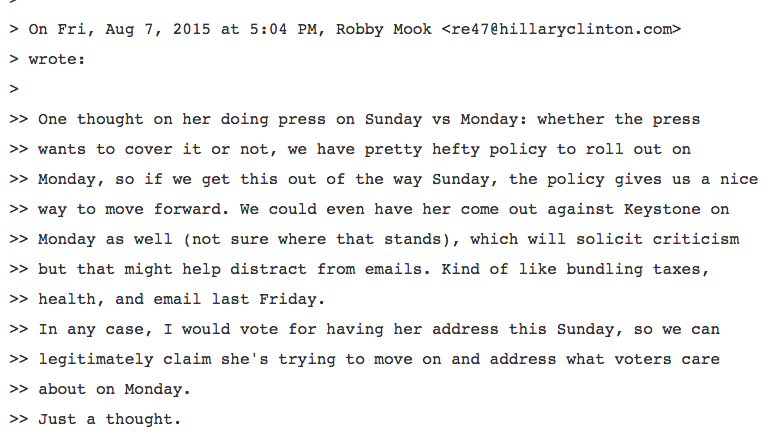A second batch of emails obtained illegally from the inbox of John Podesta, Hillary Clinton’s campaign chair, offered fresh insight Monday into her team’s attempts to minimize political damage from the controversy surrounding Clinton’s private email use.
The 2,086 emails, which were published Monday by WikiLeaks, showed campaign aides frequently discussed strategies for steering the conversation away from Clinton’s email scandal as the former secretary of state took intense heat from the media and Republicans competing in the GOP primary.
In one conversation from March of last year, for example, Podesta suggested distracting from the email saga by focusing on the congressional Benghazi inquiry. “My perspective is that we want the fight to be about Benghazi, not about servers in her basement,” Podesta wrote to Cheryl Mills, a board member at the Clinton Foundation.
The House Select Committee on Benghazi had uncovered the existence of Clinton’s private server weeks earlier, and was at that time pursuing her testimony in a closed-door meeting. That never happened, and it was not until October of last year that members of the committee were able to question Clinton in a highly-anticipated public hearing.
David Kendall, the attorney who represented Clinton when she became the target of a subsequent FBI investigation, informed senior members of Clinton’s campaign staff in June 2015 that Democrats on the Benghazi committee had quietly warned him of Rep. Trey Gowdy’s upcoming plans to attack the former secretary of state on her emails.
Kendall’s warning was not the only indication that committee Democrats coordinated with the Clinton campaign to handle potential fallout from both the Benghazi investigation and the email controversy.
Robby Mook, Clinton’s campaign manager, and other high-level staffers discussed asking the ranking Democrat on the Benghazi panel to push Gowdy to release his own emails in order to blunt his criticism of Clinton.
In an email chain from August 2015, Clinton’s campaign concluded that she should avoid addressing Benghazi or her email controversy in upcoming remarks at a Democratic National Committee event due to “the Biden questions swirling around this meeting.”
At that point in the primaries, Clinton’s inability to escape her scandals had prompted some Democrats to speculate that Vice President Joe Biden could launch a late challenge for their party’s nomination. Clinton struggled to shore up the Democratic base until she testified before the Benghazi committee in October 2015, at which point her poll numbers began to rebound amid a general consensus that she had put the Benghazi issue to bed.

Her team appeared eager to shift attention off her email controversy in the fall of last year.
In August 2015, Mook suggested unveiling Clinton’s opposition to the Keystone Pipeline as a way to take heat off the scandal.
“We could even have her come out against Keystone … which will solicit criticism but that might help distract from emails,” Mook wrote to a group of high-level campaign staffers. Clinton has indeed taken criticism over her announcement, in September 2015, that she opposed the same Keystone Pipeline project she supported as secretary of state.

Shortly after Clinton’s email use first emerged in a New York Times story last March, her campaign team considered making light of the burgeoning scandal through jokes at an EMILY’S List dinner before scrapping the plans out of fear that the controversy could grow.
“We don’t know what’s in the emails, so we are nervous about this,” wrote Mandy Grunwald, a longtime Clinton adviser. “Might get a big laugh tonight and regret it when content of emails is disclosed.”
Clinton continues to face scrutiny over her private email use, and the issue is unlikely to fade before Election Day. The Democratic nominee will weather three additional email releases before Nov. 8 , this time of records recovered by the FBI after her team attempted to delete them.
